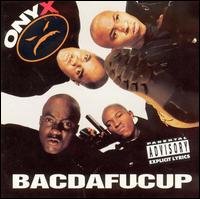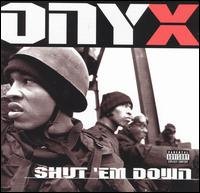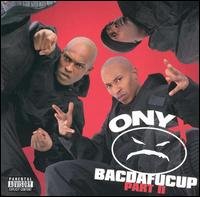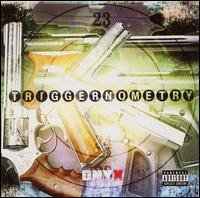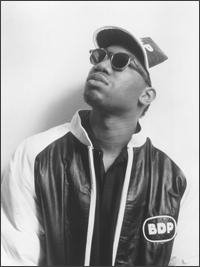 Boogie Down Productions was one of the most important and influential hip-hop groups of the latter half of the '80s. Led by the often brilliant and incendiary MC KRS-One, BDP were pioneers of both hardcore and political (or "conscious") rap — and if that seems contradictory, it also illustrates the scope of KRS-One's talent for chronicling and even shaping his culture. Musically, BDP usually employed spare, minimal backdrops that accentuated KRS-One's booming delivery, and they were also among the very first hip-hop artists to incorporate elements of Jamaican ragga and dancehall into their style. Early on, BDP devoted itself to brash but realistic narratives of ghetto life, which made them a street-level sensation; however, after the murder of original DJ Scott La Rock, KRS-One — who now essentially was BDP — devoted himself to socially and politically conscious material that earned him the nickname "the Teacher." In the process, he helped pave the way for both gangsta rap and the positive, Afrocentric Native Tongues movement — a legacy no other rapper can claim. KRS-One retired the Boogie Down Productions moniker in the early '90s to release records under his own name; to this day, he remains one of hip-hop's most outspoken and respected intellectuals.KRS-One's real name is Laurence Krisna Parker, or simply Kris Parker; some accounts hold that he was born with the "Krisna" moniker, while others suggest it was a nickname given to him during his youth for his interest in spirituality. Born in Brooklyn's Park Slope area in 1965, his Trinidad-born father was deported not long after his birth, and he later adopted his stepfather's last name of Parker. Early in his teens, he dropped out of high school and left home, migrating to the South Bronx; although he survived mostly on the streets and in homeless shelters, he continued his education by studying extensively in public libraries. During this period, he became interested in hip-hop culture, writing his own raps and tagging graffiti under the name KRS-One (originally an abbreviation for "Kris Number One" but later turned into the acronym "Knowledge Reigns
Boogie Down Productions was one of the most important and influential hip-hop groups of the latter half of the '80s. Led by the often brilliant and incendiary MC KRS-One, BDP were pioneers of both hardcore and political (or "conscious") rap — and if that seems contradictory, it also illustrates the scope of KRS-One's talent for chronicling and even shaping his culture. Musically, BDP usually employed spare, minimal backdrops that accentuated KRS-One's booming delivery, and they were also among the very first hip-hop artists to incorporate elements of Jamaican ragga and dancehall into their style. Early on, BDP devoted itself to brash but realistic narratives of ghetto life, which made them a street-level sensation; however, after the murder of original DJ Scott La Rock, KRS-One — who now essentially was BDP — devoted himself to socially and politically conscious material that earned him the nickname "the Teacher." In the process, he helped pave the way for both gangsta rap and the positive, Afrocentric Native Tongues movement — a legacy no other rapper can claim. KRS-One retired the Boogie Down Productions moniker in the early '90s to release records under his own name; to this day, he remains one of hip-hop's most outspoken and respected intellectuals.KRS-One's real name is Laurence Krisna Parker, or simply Kris Parker; some accounts hold that he was born with the "Krisna" moniker, while others suggest it was a nickname given to him during his youth for his interest in spirituality. Born in Brooklyn's Park Slope area in 1965, his Trinidad-born father was deported not long after his birth, and he later adopted his stepfather's last name of Parker. Early in his teens, he dropped out of high school and left home, migrating to the South Bronx; although he survived mostly on the streets and in homeless shelters, he continued his education by studying extensively in public libraries. During this period, he became interested in hip-hop culture, writing his own raps and tagging graffiti under the name KRS-One (originally an abbreviation for "Kris Number One" but later turned into the acronym "Knowledge ReignsSupreme Over Nearly Everyone"). Read More
Boogie Down Productions - Criminal Minded (1987: Sugar Hill)
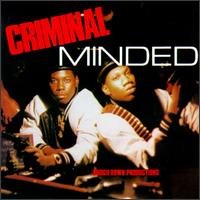 Criminal Minded is widely considered the foundation of hardcore rap, announcing its intentions with a cover photo of KRS-One and Scott La Rock (on his only album with Boogie Down Productions) posing with weapons — an unheard-of gesture in 1987. BDP weren't the first to rap about inner-city violence and drugs, and there's no explicit mention of gangs on Criminal Minded, but it greatly expanded the range of subject matter that could be put on a rap record, and its grittiest moments are still unsettling today. Actually, that part of its reputation rests on just a handful of songs. Overall, the record made its impact through sheer force — not only KRS-One's unvarnished depictions of his harsh urban environment, but also his booming delivery and La Rock's lean, hard backing tracks (which sound a little skeletal today, but were excellent for the time). It's important to note that KRS-One hadn't yet adopted his role as the Teacher, and while there are a few hints of an emerging social consciousness, Criminal Minded doesn't try to deliver messages, make judgments, or offer solutions. That's clear on "South Bronx" and "The Bridge Is Over," two of the most cutting — even threatening — dis records of the '80s, which were products of a beef with Queens-based MC Shan. They set the tone for the album, which reaches its apex on the influential, oft-sampled "9mm Goes Bang." It's startlingly violent, even if KRS-One's gunplay is all in self-defense, and it's made all the more unsettling by his singsong ragga delivery. Another seminal hardcore moment is "P Is Free," which details an encounter with a crack whore for perhaps the first time on record. Elsewhere, there are a few showcases for KRS-One's pure rhyming skill, most notably "Poetry" and the title track. Overall it's very consistent, so even if the meat of Criminal Minded is the material that lives up to the title, the raw talent on display is what cements the album's status as an all-time classic.
Criminal Minded is widely considered the foundation of hardcore rap, announcing its intentions with a cover photo of KRS-One and Scott La Rock (on his only album with Boogie Down Productions) posing with weapons — an unheard-of gesture in 1987. BDP weren't the first to rap about inner-city violence and drugs, and there's no explicit mention of gangs on Criminal Minded, but it greatly expanded the range of subject matter that could be put on a rap record, and its grittiest moments are still unsettling today. Actually, that part of its reputation rests on just a handful of songs. Overall, the record made its impact through sheer force — not only KRS-One's unvarnished depictions of his harsh urban environment, but also his booming delivery and La Rock's lean, hard backing tracks (which sound a little skeletal today, but were excellent for the time). It's important to note that KRS-One hadn't yet adopted his role as the Teacher, and while there are a few hints of an emerging social consciousness, Criminal Minded doesn't try to deliver messages, make judgments, or offer solutions. That's clear on "South Bronx" and "The Bridge Is Over," two of the most cutting — even threatening — dis records of the '80s, which were products of a beef with Queens-based MC Shan. They set the tone for the album, which reaches its apex on the influential, oft-sampled "9mm Goes Bang." It's startlingly violent, even if KRS-One's gunplay is all in self-defense, and it's made all the more unsettling by his singsong ragga delivery. Another seminal hardcore moment is "P Is Free," which details an encounter with a crack whore for perhaps the first time on record. Elsewhere, there are a few showcases for KRS-One's pure rhyming skill, most notably "Poetry" and the title track. Overall it's very consistent, so even if the meat of Criminal Minded is the material that lives up to the title, the raw talent on display is what cements the album's status as an all-time classic.Click To Download
Boogie Down Productions - By All Means Necessary (1988: Jive/Novus)
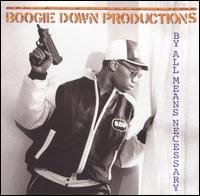 The murder of DJ Scott La Rock had a profound effect on KRS-One, resulting in a drastic rethinking of his on-record persona. He re-emerged the following year with By All Means Necessary, calling himself the Teacher and rapping mostly about issues facing the black community. His reality rhymes were no longer morally ambiguous, and this time when he posed on the cover with a gun, he was mimicking a photo of Malcolm X. As a social commentator, this is arguably KRS-One's finest moment. His observations are sharp, lucid, and confident, yet he doesn't fall prey to the preachiness that would mar some of his later work, and he isn't afraid to be playful or personal. The latter is especially true on the subject of La Rock, whose memory hangs over By All Means Necessary — not just in the frequent name-checks, but in the minimalist production and hard-hitting 808 drum beats that were his stock-in-trade on Criminal Minded. La Rock figures heavily in the album opener, "My Philosophy," which explains BDP's transition and serves as a manifesto for socially conscious hip-hop. The high point is the impassioned "Stop the Violence," a plea for peace on the hip-hop scene that still hasn't been heeded. Even as KRS-One denounces black-on-black crime, he refuses to allow the community to be stereotyped, criticizing the system that scoffs at that violence on the spoken recitation "Necessary." "Illegal Business" is a startlingly perceptive look at how the drug trade corrupts the police and government, appearing not long before the CIA's drug-running activities in the Iran-Contra Affair came to light. There are also some lighter moments in the battle-rhyme tracks, and a witty safe-sex rap in "Jimmy," a close cousin to The Jungle Brothers' "Jimbrowski." Lyrics from this album have been sampled by everyone from Prince Paul to N.W.A., and it ranks not only as KRS-One's most cohesive, fully realized statement, but a landmark of political rap that's unfairly lost in the shadow of Public Enemy's It Takes a Nation oа Millions.
The murder of DJ Scott La Rock had a profound effect on KRS-One, resulting in a drastic rethinking of his on-record persona. He re-emerged the following year with By All Means Necessary, calling himself the Teacher and rapping mostly about issues facing the black community. His reality rhymes were no longer morally ambiguous, and this time when he posed on the cover with a gun, he was mimicking a photo of Malcolm X. As a social commentator, this is arguably KRS-One's finest moment. His observations are sharp, lucid, and confident, yet he doesn't fall prey to the preachiness that would mar some of his later work, and he isn't afraid to be playful or personal. The latter is especially true on the subject of La Rock, whose memory hangs over By All Means Necessary — not just in the frequent name-checks, but in the minimalist production and hard-hitting 808 drum beats that were his stock-in-trade on Criminal Minded. La Rock figures heavily in the album opener, "My Philosophy," which explains BDP's transition and serves as a manifesto for socially conscious hip-hop. The high point is the impassioned "Stop the Violence," a plea for peace on the hip-hop scene that still hasn't been heeded. Even as KRS-One denounces black-on-black crime, he refuses to allow the community to be stereotyped, criticizing the system that scoffs at that violence on the spoken recitation "Necessary." "Illegal Business" is a startlingly perceptive look at how the drug trade corrupts the police and government, appearing not long before the CIA's drug-running activities in the Iran-Contra Affair came to light. There are also some lighter moments in the battle-rhyme tracks, and a witty safe-sex rap in "Jimmy," a close cousin to The Jungle Brothers' "Jimbrowski." Lyrics from this album have been sampled by everyone from Prince Paul to N.W.A., and it ranks not only as KRS-One's most cohesive, fully realized statement, but a landmark of political rap that's unfairly lost in the shadow of Public Enemy's It Takes a Nation oа Millions.Click To Download
Boogie Down Productions - The Blueprint of Hip Hop (Jun 1989: Jive)
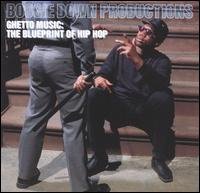 The second Boogie Down Productions album devoted mostly to consciousness raising, Ghetto Music: The Blueprint of Hip Hop finds KRS-One evolving into a fierce advocate for both his community and his chosen art form. He's particularly concerned about the direction of the latter: he's wary of hip-hop being co-opted by the pop mainstream, and the album's title comes from his conviction that real hip-hop is built on the vitality and rebelliousness of the streets. Accordingly, Ghetto Music contains a few more battle rhymes than usual, plus some showcases for pure MC technique, in keeping with the most basic elements of the music. The production, too, is still resolutely minimalist, and even if it's a little more fleshed-out than in the past, it consciously makes no concessions to pop or R&B accessibility. There are more reggae inflections in KRS-One's delivery than ever before, audible in about half the tracks here, and the production starts to echo dancehall more explicitly on a few. Meanwhile, as the Teacher, he's actually put together lesson plans for a couple tracks: "Why Is That?" and "You Must Learn" are basically lectures about biblical and African-American history, respectively. This is where KRS-One starts to fall prey to didacticism, but he has relevant points to make, and the rapping is surprisingly nimble given all the information he's trying to pack in. Elsewhere, "Who Protects Us from You?" is a bouncy anti-police-brutality rap, and KRS closes the album with the point that "World Peace" can only be achieved through a pragmatic, aggressive struggle for equality. Although Ghetto Music has a few signs that KRS is starting to take himself a little too seriously (he dubs himself a metaphysician in the liner notes), overall it's another excellent effort and the last truly great BDP album.
The second Boogie Down Productions album devoted mostly to consciousness raising, Ghetto Music: The Blueprint of Hip Hop finds KRS-One evolving into a fierce advocate for both his community and his chosen art form. He's particularly concerned about the direction of the latter: he's wary of hip-hop being co-opted by the pop mainstream, and the album's title comes from his conviction that real hip-hop is built on the vitality and rebelliousness of the streets. Accordingly, Ghetto Music contains a few more battle rhymes than usual, plus some showcases for pure MC technique, in keeping with the most basic elements of the music. The production, too, is still resolutely minimalist, and even if it's a little more fleshed-out than in the past, it consciously makes no concessions to pop or R&B accessibility. There are more reggae inflections in KRS-One's delivery than ever before, audible in about half the tracks here, and the production starts to echo dancehall more explicitly on a few. Meanwhile, as the Teacher, he's actually put together lesson plans for a couple tracks: "Why Is That?" and "You Must Learn" are basically lectures about biblical and African-American history, respectively. This is where KRS-One starts to fall prey to didacticism, but he has relevant points to make, and the rapping is surprisingly nimble given all the information he's trying to pack in. Elsewhere, "Who Protects Us from You?" is a bouncy anti-police-brutality rap, and KRS closes the album with the point that "World Peace" can only be achieved through a pragmatic, aggressive struggle for equality. Although Ghetto Music has a few signs that KRS is starting to take himself a little too seriously (he dubs himself a metaphysician in the liner notes), overall it's another excellent effort and the last truly great BDP album.Boogie Down Productions - Edutainment (Jul 1990: Jive)
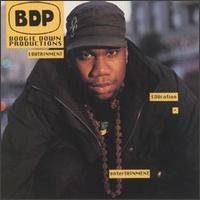 KRS-One's artistic winning streak continued with Edutainment, Boogie Down Productions' fourth album. True to form, he focuses on black history and speaks out on homelessness, racism, police excesses, and materialism with clarity and insight. KRS was often compared to Public Enemy leader Chuck D because of his consistently sociopolitical focus, but there's no mistaking the fact that his unique mixture of black nationalism, Eastern religion (both Hinduism and Buddhism), and Rastafarian philosophy is very much his own. From a commercial standpoint, he had become a little too intellectual and wasn't selling as many albums as many in rap's gangsta school. But from an artistic perspective, Edutainment is as commendable as it is riveting.
KRS-One's artistic winning streak continued with Edutainment, Boogie Down Productions' fourth album. True to form, he focuses on black history and speaks out on homelessness, racism, police excesses, and materialism with clarity and insight. KRS was often compared to Public Enemy leader Chuck D because of his consistently sociopolitical focus, but there's no mistaking the fact that his unique mixture of black nationalism, Eastern religion (both Hinduism and Buddhism), and Rastafarian philosophy is very much his own. From a commercial standpoint, he had become a little too intellectual and wasn't selling as many albums as many in rap's gangsta school. But from an artistic perspective, Edutainment is as commendable as it is riveting.Boogie Down Production - Live Hardcore Worldwide (Mar 12, 1991: Jive)
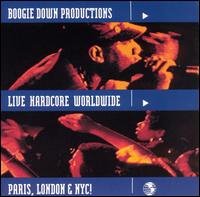 Live albums are a rarity in rap — and understandably so. In contrast to funk and soul bands of the 1960s and '70s — many of whom couldn't wait to "take it to the stage" and were thrilling live — hip-hoppers have been so reliant on technology that their live performances usually leave much to be desired. Many rappers have excelled in the studio only to be frightfully awkward and forgettable live. It came as a major surprise when Boogie Down Productions released this live album. While KRS-One's performances of such gems as "Jimmy," "The Bridge Is Over," "My Philosphy," and "South Bronx" are enjoyable, a lot is clearly lost in the transition from the studio to the stage. Like so many rappers — or for that matter, '90s urban contemporary artists — KRS is simply too studio-oriented to generate the kind of excitement that bands like Parliament and The Ohio Players did on-stage.
Live albums are a rarity in rap — and understandably so. In contrast to funk and soul bands of the 1960s and '70s — many of whom couldn't wait to "take it to the stage" and were thrilling live — hip-hoppers have been so reliant on technology that their live performances usually leave much to be desired. Many rappers have excelled in the studio only to be frightfully awkward and forgettable live. It came as a major surprise when Boogie Down Productions released this live album. While KRS-One's performances of such gems as "Jimmy," "The Bridge Is Over," "My Philosphy," and "South Bronx" are enjoyable, a lot is clearly lost in the transition from the studio to the stage. Like so many rappers — or for that matter, '90s urban contemporary artists — KRS is simply too studio-oriented to generate the kind of excitement that bands like Parliament and The Ohio Players did on-stage.Click To Download
Boogie Down Production - Sex and Violence (Feb 25, 1992: Jive/Novus)
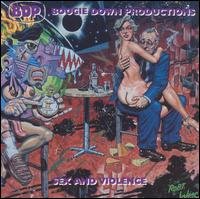 The final album released under the Boogie Down Productions name, Sex and Violence is a partial return to form after the overly preachy ego trip of Edutainment. Specifically, it's a return to the aggressive beats of KRS-One's earlier work, except with a more contemporary sound — this is the first BDP album to rely on multiple outside producers, which supplies a much-needed sonic update. As a result, some BDP fans feel that Sex and Violence is an underrated effort — it packs more of a punch, and KRS-One is refocusing on the art of MCing, not to mention his dancehall reggae influence. That said, it isn't a complete success, since his usual consistency of vision isn't quite there. There are a number of good moments: the single "Duck Down," "Like a Throttle" (which fears that Islamic spirituality has become nothing but a hip-hop fad), and "Poisonous Products." But elsewhere, some of his observations are more provocative than immediately insightful. He urges the "Drug Dealer" to invest his profits in the black community, and on "Build and Destroy" he brands high-ranking black officials like Clarence Thomas and Colin Powell nothing short of devils for their assimilation. Plus, "13 and Good" and "Say Gal" both have a discomforting undercurrent of misogyny unbecoming a teacher. There's enough vitality on Sex and Violence to make it worthwhile for fans, but overall it doesn't rank with the best of KRS-One's work.
The final album released under the Boogie Down Productions name, Sex and Violence is a partial return to form after the overly preachy ego trip of Edutainment. Specifically, it's a return to the aggressive beats of KRS-One's earlier work, except with a more contemporary sound — this is the first BDP album to rely on multiple outside producers, which supplies a much-needed sonic update. As a result, some BDP fans feel that Sex and Violence is an underrated effort — it packs more of a punch, and KRS-One is refocusing on the art of MCing, not to mention his dancehall reggae influence. That said, it isn't a complete success, since his usual consistency of vision isn't quite there. There are a number of good moments: the single "Duck Down," "Like a Throttle" (which fears that Islamic spirituality has become nothing but a hip-hop fad), and "Poisonous Products." But elsewhere, some of his observations are more provocative than immediately insightful. He urges the "Drug Dealer" to invest his profits in the black community, and on "Build and Destroy" he brands high-ranking black officials like Clarence Thomas and Colin Powell nothing short of devils for their assimilation. Plus, "13 and Good" and "Say Gal" both have a discomforting undercurrent of misogyny unbecoming a teacher. There's enough vitality on Sex and Violence to make it worthwhile for fans, but overall it doesn't rank with the best of KRS-One's work.
 The final album released under the Boogie Down Productions name, Sex and Violence is a partial return to form after the overly preachy ego trip of Edutainment. Specifically, it's a return to the aggressive beats of KRS-One's earlier work, except with a more contemporary sound — this is the first BDP album to rely on multiple outside producers, which supplies a much-needed sonic update. As a result, some BDP fans feel that Sex and Violence is an underrated effort — it packs more of a punch, and KRS-One is refocusing on the art of MCing, not to mention his dancehall reggae influence. That said, it isn't a complete success, since his usual consistency of vision isn't quite there. There are a number of good moments: the single "Duck Down," "Like a Throttle" (which fears that Islamic spirituality has become nothing but a hip-hop fad), and "Poisonous Products." But elsewhere, some of his observations are more provocative than immediately insightful. He urges the "Drug Dealer" to invest his profits in the black community, and on "Build and Destroy" he brands high-ranking black officials like Clarence Thomas and Colin Powell nothing short of devils for their assimilation. Plus, "13 and Good" and "Say Gal" both have a discomforting undercurrent of misogyny unbecoming a teacher. There's enough vitality on Sex and Violence to make it worthwhile for fans, but overall it doesn't rank with the best of KRS-One's work.
The final album released under the Boogie Down Productions name, Sex and Violence is a partial return to form after the overly preachy ego trip of Edutainment. Specifically, it's a return to the aggressive beats of KRS-One's earlier work, except with a more contemporary sound — this is the first BDP album to rely on multiple outside producers, which supplies a much-needed sonic update. As a result, some BDP fans feel that Sex and Violence is an underrated effort — it packs more of a punch, and KRS-One is refocusing on the art of MCing, not to mention his dancehall reggae influence. That said, it isn't a complete success, since his usual consistency of vision isn't quite there. There are a number of good moments: the single "Duck Down," "Like a Throttle" (which fears that Islamic spirituality has become nothing but a hip-hop fad), and "Poisonous Products." But elsewhere, some of his observations are more provocative than immediately insightful. He urges the "Drug Dealer" to invest his profits in the black community, and on "Build and Destroy" he brands high-ranking black officials like Clarence Thomas and Colin Powell nothing short of devils for their assimilation. Plus, "13 and Good" and "Say Gal" both have a discomforting undercurrent of misogyny unbecoming a teacher. There's enough vitality on Sex and Violence to make it worthwhile for fans, but overall it doesn't rank with the best of KRS-One's work.Leave your comment and click on banner to support us.Enjoy! ;)
And remember you must support artists go and buy this albums.
 The rebirth of hip-hop's originating borough the Bronx can be credited in part to this two-man crew. While late-'80s/early-'90s hip-hop had gotten to be mostly party-oriented and at times downright corny, this duo brought back some swagger and soul. Show and A.G. were the first out the box from the superb Diggin' in the Crates Crew, an elite team of MCs and producers who can claim much clout and influence on genuine East Coast hip-hop. The spirit of rap's forefathers can be felt in the gritty weight of this duo's pioneering sound. Learning from their cohort Lord Finesse, the two started an underground buzz by street promoting their demos then selling the tapes out of the trunks of their cars. The street sales helped them polish their debut single "Soul Clap" b/w "Party Groove," a cut that banged dance clubs and got love on Yo! MTV Raps for many a week, a self-titled EP was released in March of 1992. Their debut album, Runaway Slave, followed in the fall and is seen as an early-'90s hip-hop essential. The album brought a bouncing hardcore sound of crisp, jazzy horns, stiff drum kicks, and snapping snares that could get a party hopping but could also satisfy the non-dancing purist nodding his head in the back of the club. The album truly is a D.I.T.C. family affair and introduced such legendary names as the late Big L, Fat Joe, and Diamond D, whose classic debut solo album Stunts, Blunts and Hip Hop dropped the same week in 1992. The albatross of making unadulterated rap music is that it sometimes costs a crew acclaim, for Show and A.G. are some of rap's disturbingly underrated. The sequel to their raw, stripped sound came in 1995 with the under-appreciated Goodfelas and the two were major contributors to D.I.T.C.'s eponymous debut album in 2000.
The rebirth of hip-hop's originating borough the Bronx can be credited in part to this two-man crew. While late-'80s/early-'90s hip-hop had gotten to be mostly party-oriented and at times downright corny, this duo brought back some swagger and soul. Show and A.G. were the first out the box from the superb Diggin' in the Crates Crew, an elite team of MCs and producers who can claim much clout and influence on genuine East Coast hip-hop. The spirit of rap's forefathers can be felt in the gritty weight of this duo's pioneering sound. Learning from their cohort Lord Finesse, the two started an underground buzz by street promoting their demos then selling the tapes out of the trunks of their cars. The street sales helped them polish their debut single "Soul Clap" b/w "Party Groove," a cut that banged dance clubs and got love on Yo! MTV Raps for many a week, a self-titled EP was released in March of 1992. Their debut album, Runaway Slave, followed in the fall and is seen as an early-'90s hip-hop essential. The album brought a bouncing hardcore sound of crisp, jazzy horns, stiff drum kicks, and snapping snares that could get a party hopping but could also satisfy the non-dancing purist nodding his head in the back of the club. The album truly is a D.I.T.C. family affair and introduced such legendary names as the late Big L, Fat Joe, and Diamond D, whose classic debut solo album Stunts, Blunts and Hip Hop dropped the same week in 1992. The albatross of making unadulterated rap music is that it sometimes costs a crew acclaim, for Show and A.G. are some of rap's disturbingly underrated. The sequel to their raw, stripped sound came in 1995 with the under-appreciated Goodfelas and the two were major contributors to D.I.T.C.'s eponymous debut album in 2000.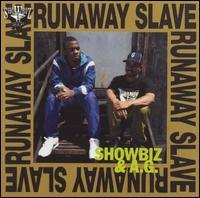
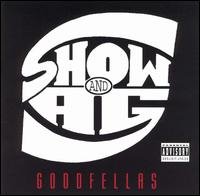 The second shot fired from D.I.T.C.'s charter members Show & A.G. is a shade darker than their debut. While 1992's Runaway Slave was definitely no new jack swing affair, Good Fellas is decidedly more grimy and a lot less playful, both on the production and the lyrical ends. The lead single, "Next Level," also remixed exceptionally on the album by DJ Premier, was the only track that made any above-ground noise. Arguably the best cut on the album, the track is a manifesto of real hip-hop over a melodic guitar sample. Much of the album rumbles along to the tune of low bass grooves and noisy ambient loops of a jazzy variety. From bouncy xylophones to the standard Showbiz horns and kick drums, the production here is tightly constructed. At the time of its release (mid-1995), East Coast hip-hop was cruising along in a rugged gangster mode. All the while an ugly coastal battle was brewing that would conspire to darken hip-hop forevermore. This album steers clear of the coast bashing despite its unmistakable East Coast stamp and appeal. A few tracks do lack a distinct flavor, but overall the methodical, unassuming D.I.T.C. sound here has since been grafted but never duplicated. Show & A.G. affirm that the road to respect-worthy hip-hop status is not through releasing an album every six months, but by letting things marinate for a few years and then proving you're still on top of your game.
The second shot fired from D.I.T.C.'s charter members Show & A.G. is a shade darker than their debut. While 1992's Runaway Slave was definitely no new jack swing affair, Good Fellas is decidedly more grimy and a lot less playful, both on the production and the lyrical ends. The lead single, "Next Level," also remixed exceptionally on the album by DJ Premier, was the only track that made any above-ground noise. Arguably the best cut on the album, the track is a manifesto of real hip-hop over a melodic guitar sample. Much of the album rumbles along to the tune of low bass grooves and noisy ambient loops of a jazzy variety. From bouncy xylophones to the standard Showbiz horns and kick drums, the production here is tightly constructed. At the time of its release (mid-1995), East Coast hip-hop was cruising along in a rugged gangster mode. All the while an ugly coastal battle was brewing that would conspire to darken hip-hop forevermore. This album steers clear of the coast bashing despite its unmistakable East Coast stamp and appeal. A few tracks do lack a distinct flavor, but overall the methodical, unassuming D.I.T.C. sound here has since been grafted but never duplicated. Show & A.G. affirm that the road to respect-worthy hip-hop status is not through releasing an album every six months, but by letting things marinate for a few years and then proving you're still on top of your game. 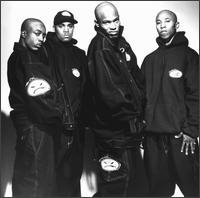 Onyx's shouting, in-your-face brand of high-volume rapping proved to be more at home in the slam pit than on the dancefloor and brought the rap quartet instant chart success. Originally formed in Queens, NY, during 1990, the members of Onyx (Fredro Starr,
Onyx's shouting, in-your-face brand of high-volume rapping proved to be more at home in the slam pit than on the dancefloor and brought the rap quartet instant chart success. Originally formed in Queens, NY, during 1990, the members of Onyx (Fredro Starr, 